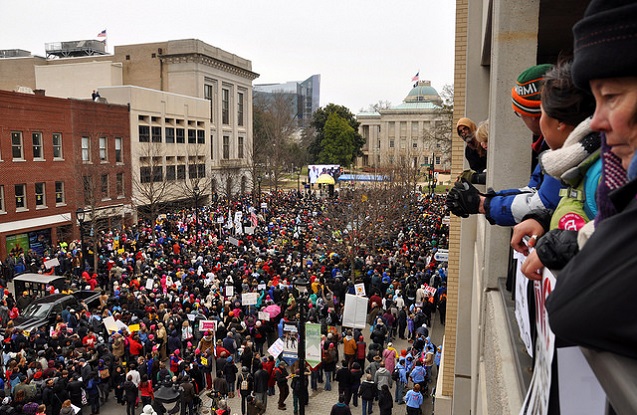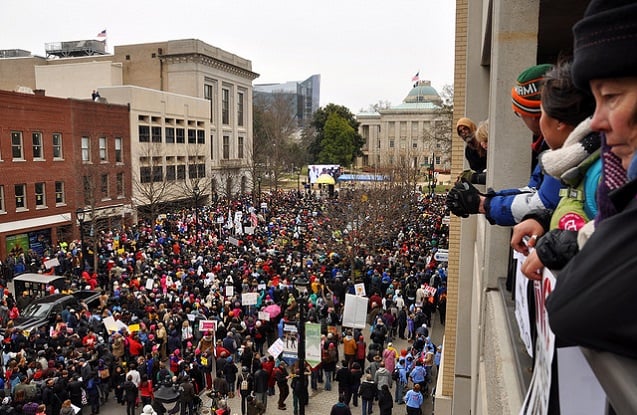
 James Willamor/ Flickr)” width=”637″ height=”415″ />February 8, 2014: Tens of thousands marched on the capital building in Raleigh, North Carolina, to protest the extreme politics of the current state government. (Photo: James Willamor/ Flickr)
James Willamor/ Flickr)” width=”637″ height=”415″ />February 8, 2014: Tens of thousands marched on the capital building in Raleigh, North Carolina, to protest the extreme politics of the current state government. (Photo: James Willamor/ Flickr)
Climate change activists should look to North Carolina for lessons on how to build a broad and diverse movement powerful enough to challenge the corrupt status quo on several fronts. Single-issue organizing won’t do.
On February 8 progressives held a huge march in Raleigh, North Carolina, that drew between 80,000 and 100,000 people. The event was led by Rev. Dr. William Barber II, president of North Carolina’s NAACP. Clearly, Reverend Barber knows a thing or two about organizing a movement. Climate change activists throughout the United States can draw some important lessons from what’s happening in North Carolina.
The main lesson is that the North Carolina movement is inclusive and all encompassing, not organized around a single issue. The people involved call themselves the “Forward Together Movement.” If you have seen any media coverage of the “Moral Mondays” protests that have been going on in Raleigh (or have watched the documentary on North Carolina produced by Bill Moyers), one obvious takeaway is that it is a very diverse movement. It is diverse not just in the class and racial backgrounds of the people involved, but in the multitude of issues the activists are organizing around.
Much of the focus centers on economic and social justice. What these North Carolinians recognize is that they have a lot in common, in that their problems stem from the extremely unequal distribution of wealth and power in our country. The utter dominance of corporate rule has left our political system broken and corrupt. The only way to fight back against such entrenched interests and attempt to reclaim some semblance of democracy is to organize massive numbers of people.
Climate change activists are focusing now on a valiant effort to pressure President Obama to block the Keystone XL pipeline. If they succeed, it will represent an important victory for the movement to salvage a livable planet from the worst effects of continuing to burn fossil fuels. But so far the movement to fight climate change overall has not shown the capacity to draw into its fold the kind of diverse race and class base that North Carolina has done. This makes the environmental movement much weaker than it needs to be to stop the powerful corporate forces planning to continue spewing their garbage into the atmosphere.
What makes the movement in North Carolina so powerful and promising is the oneness or solidarity it shows between people of many different backgrounds. They are not leaving anyone behind. All are moving “forward together.” Everyone is standing up for the rights of children, the poor, workers, immigrants, and people who face discrimination in the criminal justice system. Ensuring equal access to voting rights is a central theme, as are environmental justice issues. (It was North Carolina’s state legislature that outlawed the use of accurate climate science in considering the issue of rising sea level.) This is what the almost-forgotten term “the common good” is all about.
Many climate activists undoubtedly believe that the issue they are working on so diligently is the most important of all. They have a point: Boatloads of scientific evidence show that the climate that allowed civilization to develop is inexorably being destroyed. Activists know why it is happening, and how to stop it. What they don’t understand is why everyone else isn’t as alarmed as they are, especially given the urgency of immediate drastic action.
Leaving aside for the moment that widespread corporate propaganda aims to distract people from what’s going on behind the curtain and that our country’s culture has never fostered mass scientific literacy, there are legitimate reasons why many people are not preoccupied with climate change. People’s points of view are largely shaped by their material conditions of life. Many millions of Americans are struggling in low-wage jobs to take care of their families and pay their rent. That struggle dominates many people’s lives. They don’t see much hope for change in the political system.
Another issue that people must face is the history of racism in the United States. It was founded on slavery and the expropriation of the land of Native Americans. These and many other racist policies have left a legacy of inequality and distrust. Surely the pleas of (mainly) white environmentalists must ring hollow to many people of color who are still living with the effects of our racist history. Climate activists have largely been absent from the front lines of struggles dealing with racial justice (e.g. Trayvon Martin), immigration reform, raising the minimum wage, etc.
That’s the significance of what is happening in North Carolina. People from all different backgrounds are demonstrating their support and solidarity for everyone’s basic human rights and dignity. All those involved in the movement are educating one another about “their” issues and are getting a respectful hearing. That is how to build trust between previously separate groups. That is how to build a mighty force that cannot be contained by the oligarchy. If climate activists are paying attention, we will heed these lessons.
Join us in defending the truth before it’s too late
The future of independent journalism is uncertain, and the consequences of losing it are too grave to ignore. To ensure Truthout remains safe, strong, and free, we need to raise $27,000 in the next 24 hours. Every dollar raised goes directly toward the costs of producing news you can trust.
Please give what you can — because by supporting us with a tax-deductible donation, you’re not just preserving a source of news, you’re helping to safeguard what’s left of our democracy.